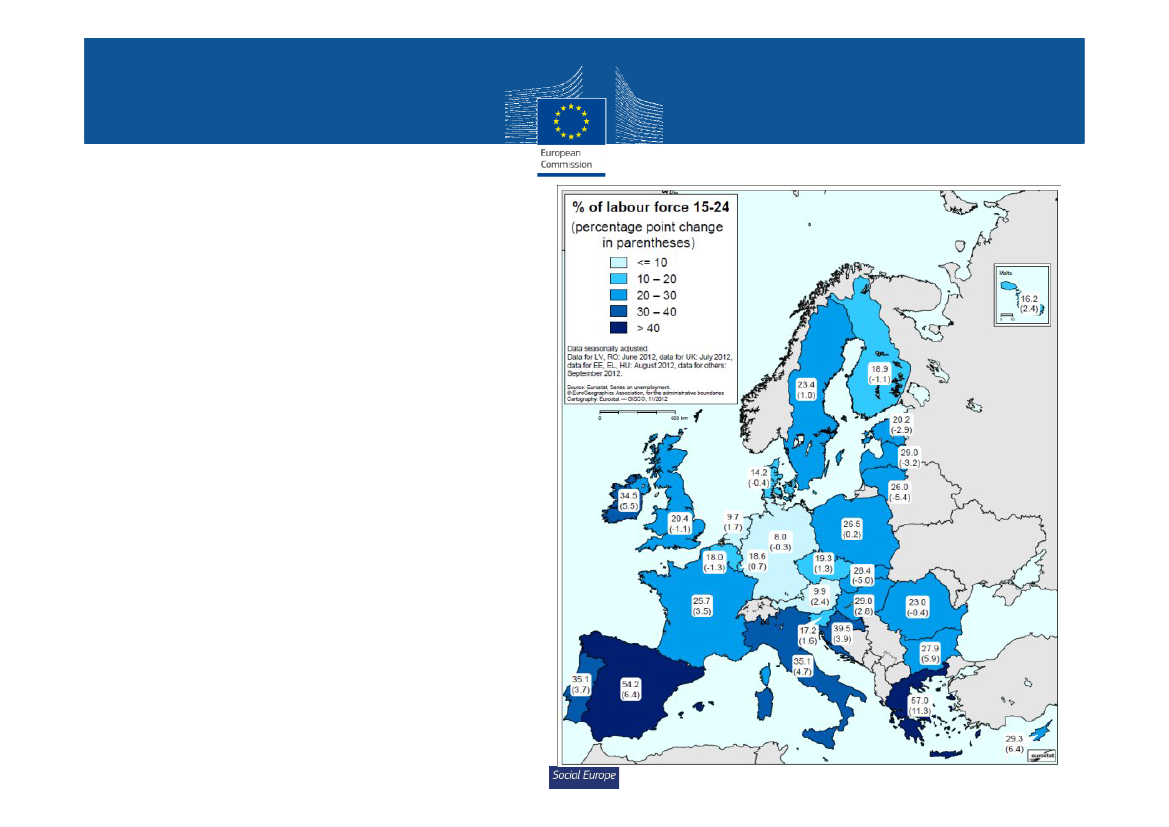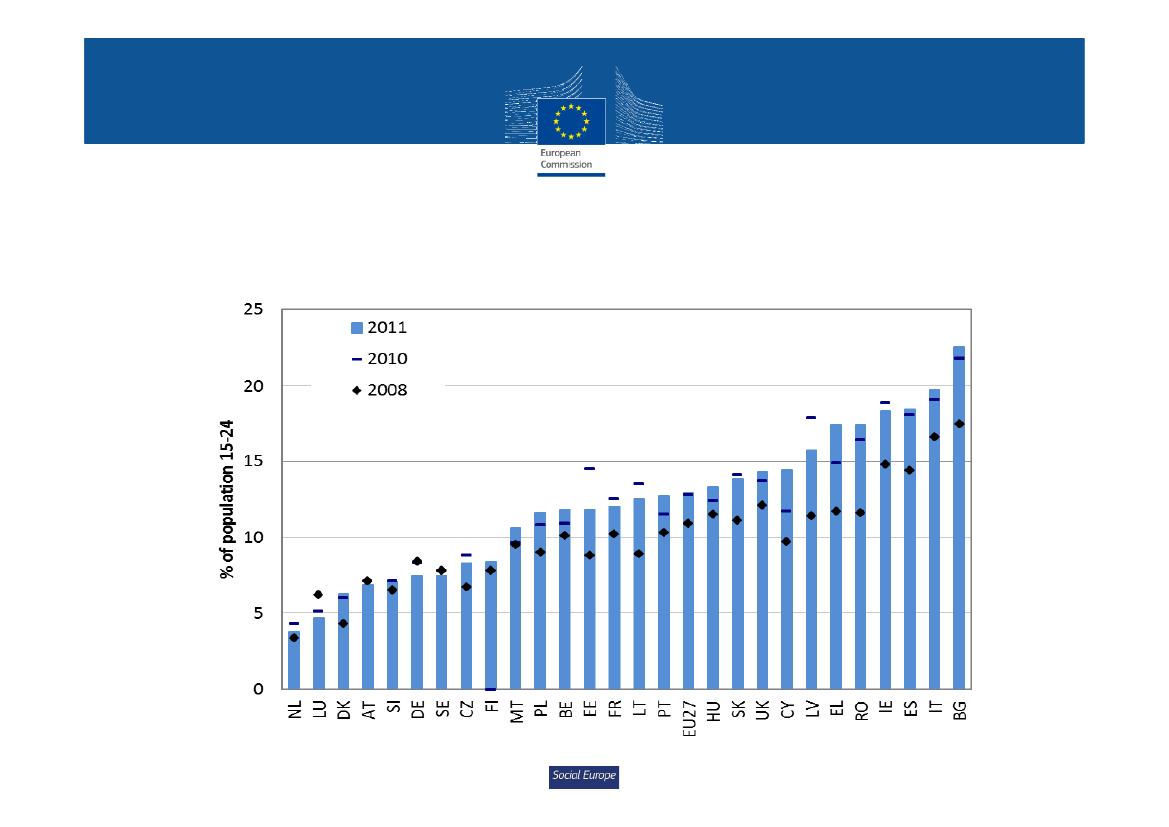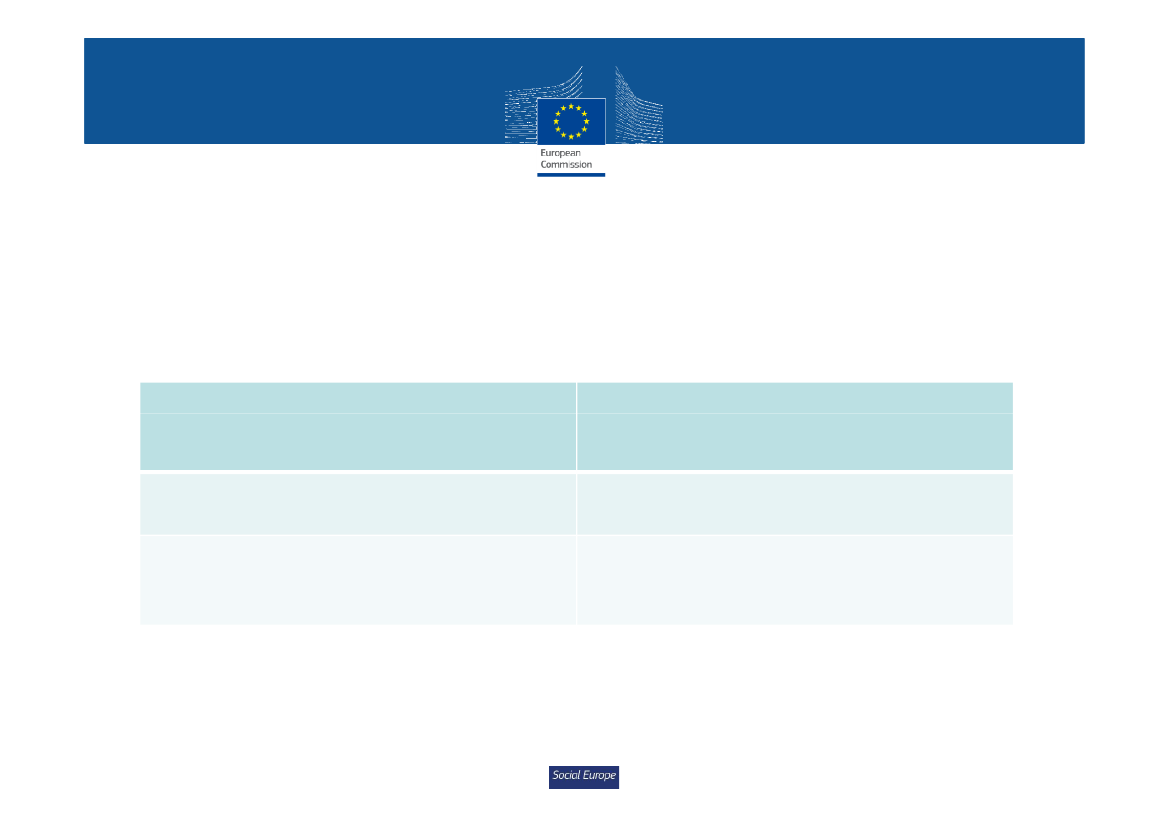Beskæftigelsesudvalget 2012-13
BEU Alm.del Bilag 109
Offentligt
“Youth Employment Package”MMM – European Parliament18 02 2013 - Brussels
Brigitte DEGEN, Policy OfficerUnit Sectorial Employment Challenges, Youth Employment & Entrepreneurship
European Commission - DG Employment, Social Affairs and Inclusion
Social Europe
The crisis has hit young people exceptionally hard• Nearly one in four young people on the labour market cannot find a job(22.8% in Sep. 2012)• EL/ES > 55%, IT, PT, BG, CY, LV, HU, SK > 30%, only AT, DE, NL < 10%• EU youth unemployment rate more than twice as high as the generalunemployment rate• More than 30% of unemployed young people long-term unemployed• 7.5 million young Europeans aged 15-24 neither in employment, nor ineducation and training (NEETs)• Young people over-represented in temporary and part-time workSocial Europe
Youth unemployment ratesand year-on-yearchanges, 09/12
Social Europe
Young people not in employment, education or training (NEET)for EU Member States, 2008, 2010 and 2011
Social Europe
Youth Employment PackageOn 5 December2012 the Commission adopted theYEP:Chapeau Communication“MovingYouth into Employment”and SWD(implementation of the YOI, overview of youth-specific CSRs and 28country-fiches)A proposal for aCouncil recommendation on establishing a YouthGuaranteeand SWDA second stageconsultation of social partnersat EU-level on aQuality framework for traineeshipsThe announcement of a "EuropeanAlliance for Apprenticeships"and of improvedmobility of young workers
Social Europe
Key problems and possible remedies• Young people dropping out of education or work; low skilled youth most atrisk of unemployment and exclusion in the longer termYouth Guarantee schemes• Difficult school-to-work transitions:Increase the supply of high-quality traineeships and apprenticeships• Growing skills and geographical mismatches, 2 million vacancies across EULabour mobility• Transitions more difficult in countries with segmented labour marketsReforms in labour market regulation
Social Europe
A Youth GuaranteeA proposal for a Council Recommendation so that Member Statesensure that all young people up to 25 receive agood-quality offerof employment,continued education, an apprenticeship or a traineeship within four months ofbecoming unemployed or leaving formal education.Youth Guarantee schemes need to be implemented by Member States at relevantlevel of governance (national, regional, local), should consider the needs of differentgroups of young people and must be accompanied by supporting measures to makethem a success:strong partnerships between all stakeholdersearly intervention and activationsupportive measures enabling labour market integrationfull use of EU Structural Fundsassessment and continuous improvement of the schemesswift implementationSocial Europe
How will Youth Guarantee Schemes befinanced (1)?Youth Guarantees represent a positive investment:Cost of Youth Guarantees(ILO 2012)Eurozone, 15-24 yearsAbout 0.22% of GDPEUR 21 billionEconomic costs of NEETs(Eurofound 2012)26 Member States (all except Malta),15-29 years1.21% of GDPEUR 153 billion
Social Europe
How will Youth Guarantee Schemes befinanced (2)?Cohesion Policy funding can provide support:•Programming period 2014-2020 includes ESF investment prioritytargeting labour market integration of young NEETs.Youth Employment Initiative:•Decided by the European Council on 7-8 February•To support measures set out in the YEP, and in particular the YouthGuarantee•EUR 6 billion for the period 2014-2020 - open to all NUTS2regions with levels of youth unemployment above 25% (in 2012)•EUR 3 billion from the ESF and a further EUR 3 billion from a new'youth employment' budget line.Social Europe
Quality Framework for TraineeshipsThe Commission launched a second-stageconsultation of EU socialpartnerson a Quality Framework for Traineeships.This followed a public consultation (April - July 2012) and a first stage of socialpartners' consultation (Sept - Oct 2012).Traineeships can increase the employability of young people and be steppingstones towards regular employment if they are of good quality in terms of• learning content and• adequate working conditions.Social partners decided not enter into negotiations, so the Commission willmake a related proposal in 2013.
Social Europe
A European Alliance for ApprenticeshipsThe European Alliance for Apprenticeships will be launched in July 2013:to improve the supply and quality of apprenticeshipspromote national partnerships for dual vocational systemschange mindsets towards apprenticeships (business, students, parents)Dual apprenticeship schemes ensure smooth transition from school to work,provided their success factors:partnership between education and training institution and companies,and involvement of social partnershigh quality qualification and learning processintegration in national/regional education and training systemsupport to vulnerable young peopleEngagement of employers based on cost-benefit ratio
Social Europe
Promote labour mobility for young peopleThe Commission will reinforce EU instruments on mobilityIncreased mobility will offer more employment opportunitiesEURES: European Employment Services network to be transformedinto a result-oriented matching and placement instrument, will includeapprenticeships and traineeships."Your first EURES Job" will be expanded, first pilot to help 5,000 youngpeople to find a job placement in another Member State (job placementplus financial incentives, e.g. travel expenses, language courses).A stakeholder consultation on developing a "EURES jobs for youngpeople programme", and putting EU mobility instruments, funding andgovernance on a more structural footing.
Social Europe
Youth Opportunities Initiative one year laterImplementation of 18 EU-level actionsMobilisation or reallocation of EU structural funds (ESF/ERDF)Action team visits to 8 Member States with youth unemployment rates above 30%(EL, ES, IE, IT, LV, LT, PT, SK)EUR 10 billion targeted for re-allocationAt least 780,000 additional young people and at least 55,000 small businesses likelyto benefitCountry-specific Recommendations (CSRs)Nearly all Member States received youth-specific recommendations (on youthemployment and facilitating school-to-work-transition)Member States undertake education and labour market reforms, national youth jobsplans
Social Europe
Conclusions• High numbers of unemployed youth result in dramatic consequences for theeconomies, the societies and above all the young people.• Young people need particular support given the structural difficulties intransitioning from school into work, not "one size fits all" solution• Investing in a Youth Guarantee is a sound investment – the costs of notdoing so would be much higher.• Primary responsibility for employment and education with Member States,but EU can play a supportive and stimulating role – we must learn from whatworks and what doesn't.
Social Europe
More informationYouth Employmenthttp://ec.europa.eu/social/youthemploymentYouth Opportunities Initiativehttp://ec.europa.eu/social/yoiYour First Eures Jobhttp://ec.europa.eu/social/yourfirsteuresjobErasmushttp://ec.europa.eu/education/erasmus/doc1063_en.htmLeonardo da Vincihttp://ec.europa.eu/education/leonardo-da-vinci/doc1021_en.htmErasmus for Entrepreneurshttp://www.erasmus-entrepreneurs.eu/Youth on the movehttp://ec.europa.eu/youthonthemoveSocial Europe















